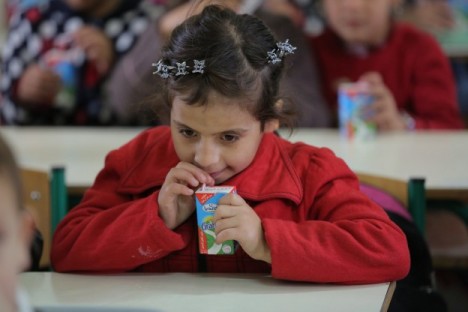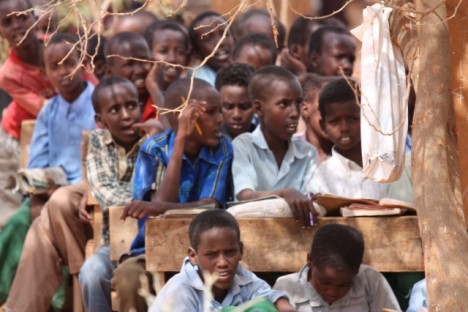Four New Ways Companies Can Support Education in Conflicts, Crises in Africa
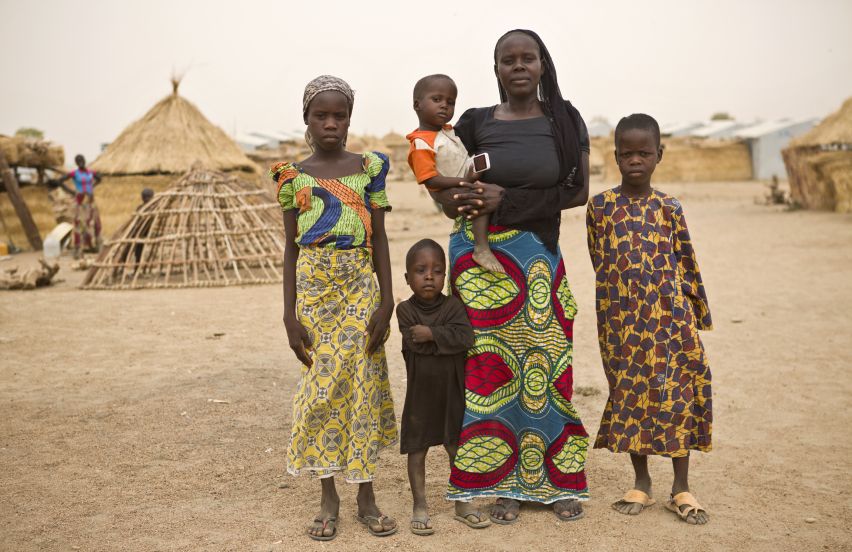
Photo by ©UNHCR / H. Caux.
Day of the African Child was established as a day to remember the ten thousand schoolchildren who, in 1976, marched down the streets of a Johannesburg township refusing to let the unjust rules of the South African apartheid regime bar them from their right to education.
Today, the Day of the African Child, also known simply as Youth Day in Africa, is a moment to remind world leaders, including governments, not only of the importance of providing access to schools to all children, but ensuring that the schools are safe places for children to learn and grow.
Last year, the education of 75 million children and youth was disrupted by conflict and emergency, and Africa was not been spared, with renewed violence forcing 1.4 million children out of school in the Central African Republic and conflict with Boko Haram leaving 1 million children with little or no access to school.
Despite these challenges, there remains a clear role for private sector entities to contribute solutions to overcome barriers to education that arise from conflict and crisis in Africa. Companies can strategically align their investments to leverage their core assets, provide services, leadership, expertise, funds, or create innovative education solutions for those most marginalized. Investing in education in these contexts is also critical for rebuilding societies in ways that impact the business operating environment, enabling business to proactively strengthen their longer-term operations; improve brand visibility, reputation, and customer loyalty; strengthen trust amongst customers, political leaders and communities; manage operational risks; and develop goodwill with local communities.
To learn more about how companies can make an impact in creative and successful ways, check out a selection of examples below.
While these efforts demonstrate how the private sector can be effective, there is still lots of work that needs to be done. To learn more about how your company can partner to reach children in Africa, please reach out to us at info@gbc-education.org!
1. Eneza Education: Bridging Learning Deserts Through Mobile
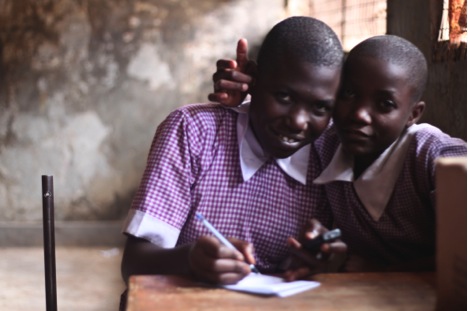
Photo By Eneza Education/Media.
In another take on “virtual classrooms,” Kenyan startup company Eneza Education bridges learning deserts for low-income kids in rural areas by providing educational content via low-end cell phones. Targeting students aged 11 to 18 who are considered at “the very end of the last mile,” or the hardest to reach children who either can’t attend school due to conflict, are girls burdened by household duties, early marriage, or those who have already dropped out of school, users can spend 50 U.S. cents a month to learn math, science, and English. Virtual teachers offer support (they can be reached within an hour of sending a text message) and users can search Wikipedia through texting. Student learning can be easily assessed through the 2,000 quizzes, 16,000 questions, and mini lessons available should they score poorly. By the end of 2014, Eneza boasted more than 375,000 users across Kenya, and the company hopes to reach 50 million in the next five years in 10 African countries.
2. Telma: Coordinating Crisis Response
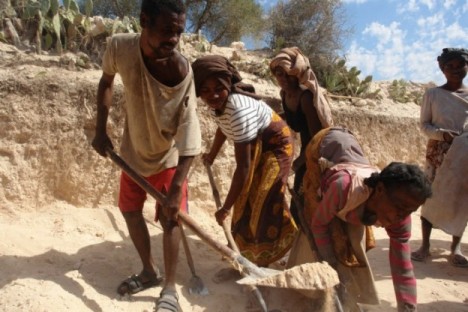
Photo By WFP/Volana Rarivoson.
Over the past 35 years, Madagascar has suffered from more than 50 natural disasters including cyclones, floods, locust infestations and, most recently, a drought that has caused widespread crop failures and a severe food crisis in the country’s southern region since late 2014. In a low income country where 70 percent of the population is comprised of rural communes already suffering from an extremely low-functioning water supply, Madagascar’s ongoing drought has been declared an emergency requiring assistance from leaders across the globe, including private sector companies like local Malagasy telecommunications company, Telma. In partnership with the government’s National Bureau for Risk and Disaster Management, the company leveraged their communications technology to develop an SMS alert system for zones vulnerable to natural disasters. In 2014, Telma took that partnership further to innovate the Private Sector Humanitarian Platform of Madagascar through which they could not only coordinate a disaster response among 72 private companies to aid during the most recent drought, but during other emergencies like floods, cyclones, and insect infestations as well. The company’s corporate foundation, Telma Foundation, also works with other partners such as Western Union to coordinate financing and CARE to distribute relief, while Telma specializes in providing victims with tools such as phones — all of which were critical to the rehabilitation of the community, including removing barriers to education so children can return to school.
3. Tetra Pak: Supporting Learning Through School Nutrition
The UN World Food Programme (WFP) estimates that 66 million primary school children in the developing world arrive at school hungry. To provide one school meal per day, $75 billion is needed annually. While the majority of the financing comes from governments, private supporters provide significant contributions with a clear return on investment: For every $1 spent, at least $3 is gained thanks to boosted health, school performance, and economic development. As a multinational leader in the food packaging industry with headquarters in South Africa, Tetra Pak supports school feeding programs in Sub-Saharan Africa where it is estimated that one in four children are undernourished. Through the distribution of their Aseptic packages containing milk, which can be stored in ambient temperatures without cooling or preservatives and tailored to contain educational messages, Tetra Pak is working to combat the crisis of food insecurity in the region.
4. Zensho: Equipping Refugee Children With Relief Items
For the past 25 years, Somalia’s Civil War has displaced more than 1 million people within the country, leading to the creation of the largest refugee camp in the world as thousands flee to the eastern border with Kenya. Today, the crisis remains one of the most protracted in the world. In July 2011, the emergency was exacerbated by a severe drought in southern Somalia, leading the United Nations to declare the region a famine area. In response, Zensho, the operator of multiple Japanese restaurant chains, began distributing milk weekly to support school meals for 18,000 children ages 3-5 within the Dadaab refugee camp. Paramount to Zensho’s success was their partnerships with a local creamery who manufactured the dairy product nearby in Kenya, a freight forwarding company to assist with logistics, and the Department of Refugee Affairs in Kenya to both store and distribute the milk within the camp. As a result, Zensho found that, along with the increase in milk pack distribution came the increase in school enrollment.

